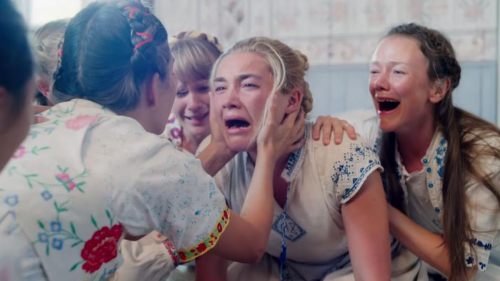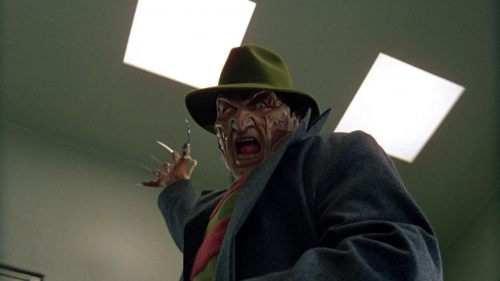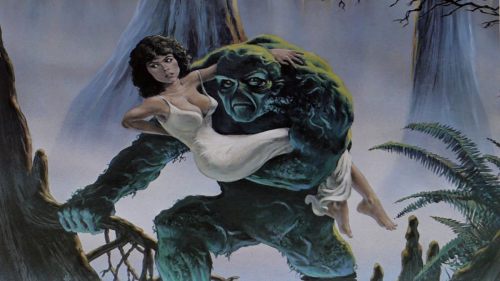Sunday Reads - Nuclear Men & Monsters: Alexandre Aja’s THE HILLS HAVE EYES (2006)
Wes Craven's The Hills Have Eyes ('77) is an exploitation mainstay; a howl of primal rage against the Vietnam War that followed a period of (pornographic) silence from the director's downright incendiary debut, The Last House On the Left ('72). Centered around a family of ugly Americans who break down in the desert, they're slowly picked apart by a group of savages living in this unforgiving wasteland. The violence, brutality and sexual abuse reaches unimaginable heights, forcing the city folk to shed their civil skins and strike back, descending into an abyss of madness and awfulness all their own. It was a refutation of the notion that good ol' boys were here to do anything more than give in to primal impulses, slaughtering those who invade as a reactionary measure of self-debasement.
The problem with The Hills Have Eyes is that Craven's repeating himself somewhat, albeit with a sharper eye and more refined technical skill, thanks to his work in smut (the oddly autobiographical Fireworks Woman ['75] being the pinnacle of his "Abe Snake Years"). Yet the concept and iconography minted via the movie - most importantly Michael Berryman's oblong, bald dome and deeply suken eyes - were enough to capture the imaginations of sleaze hounds for decades, as Craven proved himself capable of staging horrific set pieces that are viably shocking (his ugly usage of rape imagery again present and accounted for). He was born for it, so to speak; a natural pulp huckster who liberally used a license to disgust.
This is all a very fancy way of saying that - regardless of its place in filmic history - the original Hills is far from being a sacred text. Yet when Alexandre Aja's remake was originally announced in '05, many horror fans side-eyed the proposition, despite the director having already proven himself quite capable with the New French Extremity slasher, Haute Tension ('03). That movie was so brutal that, when it came to America, several minutes were trimmed in order to obtain an R-rating (and the remaining gore paired well with the Fulci-esque dubbing utilized in US prints). Superficially, Aja possessed the splatter bona fides to deliver on a project with this much pedigree. Add on the fact that he was co-writing his Hills with Tension writing/producing partner Grégory Levasseur, and hired KNB FX to handle the gruesome madness, and there was really no viable reason to question the artist beyond blind fidelity to Craven's original.
Thankfully, Aja delivered on his promise, crafting what's easily one of the best horror remakes period - though never quite reaching the transcendent level of John Carpenter's The Thing ('82) or David Cronenberg's The Fly ('86). Instead of attempting to reinvent Craven's film completely, Aja keeps the essential template intact, and tosses in his own flair for gut-churning showmanship and problematic politics. The end result is a movie that's almost myopically cruel, while tackling beliefs of American exceptionalism, and the country's need to annihilate its enemies, often at the cost of its own people. Where Craven had made a picture protesting a very specific era in American history, Aja's designed a piece of pulpy dissent that challenges the very notion of American Greatness itself, rising to near satirical levels of mockery regarding traditions of red, white and blue masculinity.
The set up is borrowed beat-for-beat from Craven's original narrative. Big Bob Carter (Ted Levine) is taking his wife Ethel (Kathleen Quinlan), and their brood - daughters Brenda (Emilie de Ravin) and Lynn (Vinessa Shaw), youngest son Bobby (Dan Byrd), and son-in-law Doug (Aaron Stanford) - on a vacation trek to California. As they make their way through the New Mexico desert, they stop at a dilapidated gas station, where the attendant (Tom Bower) directs them to a short cut. Little do they know, the pump jockey is reluctantly in cahoots with a tribe of cannibals. Only in Aja's vision of this literally bombed out America, the flesh-hungry human deformities live in an Atomic Village, where the United States government performed nuclear tests. In the name of devastating another people, the US had mutated some of their own blue collar workers (as these were miners who refused to leave their homes) into monsters, who consume anyone unfortunate enough to stumble into their apocalyptic domain.
The movie's not subtle about its politics, opening with a title card regarding the 331 atmospheric nuclear tests America performed from '45 - '64, and the government's subsequent denial of any effects the resulting radiation may have had on nearby communities. After the tires on their trailer are slashed, Big Bob and his loving son are quick to go for the guns, waving them around while the head of the house mocks his daughter's weak excuse for a husband for being "a Democrat" and afraid of the weapons. Their dogs are two Shepherds, Beauty and Beast; fanged guards of the motherland, allowed to run wild (just like the first film). These are stereotypically brutish suburbanites, being photographed in a landscape where their rulers have done so much devastation in the name of potential war that they've scorched the Earth back to God's earliest drafts of dirt and dust. Welcome to the United States, where it's tough to tell the men from the monsters.
Regardless of the vacationers' firepower, the hill tribe are the ones who still prove to be almost elementally cruel. When night falls and Bob wanders back toward the gas station, hoping to locate any assistance for their downed vehicle, two inbred grotesqueries descend on the camp, and Aja stages one of the most vile and perverted set pieces to ever grace the screen. Pluto (Michael Bailey Smith) and Lizard (Robert Joy) crucify and burn Big Bob alive, before raping Brenda and then violating Lynn - mother to a newborn baby - in a haunting fashion that's too unbelievable to even put down on paper (all while keeping a revolver pointed in her infant's face). Suddenly, we're no longer watching the product of an American studio. Aja has somehow smuggled the litmus test sadism New Extremity was known for into a cash-in remake. It's a beastly subversion of Intellectual Property, turning a potential date night movie into a showcase for human suffering.
But fuck the United States. At least, that's what this Hills Have Eyes is basically saying, especially once Doug journeys into the Nuclear Village, hoping to rescue the baby after the natives stole her from the trailer. There he finds a whole community, trying to live on in these antiquated digs, as if the nuclear blasts had frozen Rockwellian portraits of the '50s, allowing these freaks to crawl right into their frames, knocking soot-coated dummies aside. Aja and Levasseur are again forcing the audience to confront two sides to American history - that which we believed we were preserving with atomic might, with stark evidence of the lengths the country would go to "defend" their "values". Before Pluto starts tossing Doug through walls, a chair-bound sideshow attraction named Big Brain (you can probably guess why) verbalizes the movie's rejection of American strength (not to mention the notion of manifest destiny):
"Your people asked our families to leave the towns, and you destroyed our homes. We went into the mines, you set off your bombs, and turned everything to ashes. You made us what we've become. Boom! Boom! Boom!"
When The Hills Have Eyes remake was released in '06, many took it as a War On Terror parable, but Aja seems more interested in the overarching historical notion of America appointing itself a "might is right" world watchdog and colonialist power, both taking land in the name of creation while being capable of mass chaos. Had Craven included the same speech in his own post-Vietnam regurgitation of disgust, it wouldn't feel out of place at all. As if not content with having Big Brain shout the movie's themes at us, he later has Doug kill more than one of these mutants with a flag pole, stars and stripes attached, as if the country itself had conquered them yet again.The Democrat has to embrace his inner warhawk in order to avenge his family, muddying the movie's already murky morality.
Like the Mondo documentaries that came out of Italy during the '60s (Africa, Blood and Guts ['66] being a prime example), New French Extremity often borders on becoming that which it's condemning, simply through excessive violence and gore. With The Hills Have Eyes, Aja's movie has a character make fun of the "sissy Democrat", before displaying just how capable of atrocity the liberal is when pushed too far. It's a movie where the mutants may be more sympathetic than the human "heroes", as we realize they've known no other way to live because of the savagery inflicted on them by their own country. At the same time, it's difficult to claim a picture is "anti-violence" when it so clearly enjoys making the audience squirm in discomfort, smearing buckets of blood across the screen. At the risk of becoming a horror blasphemer, Aja's Hills is far more complicated than Craven's, once you begin chewing on it after the credits roll. By the end, everyone's defeated, despite victories achieved and enemies vanquished. Maybe that's the ultimate lesson: destruction only begets further destruction, regardless of your core beliefs. We all die once the bombs start going off.



